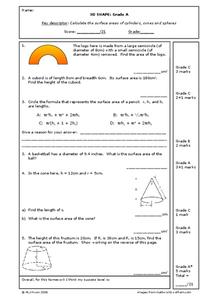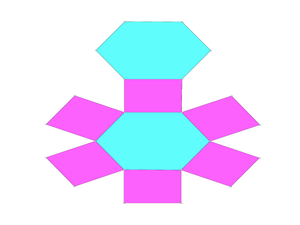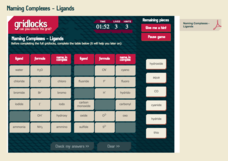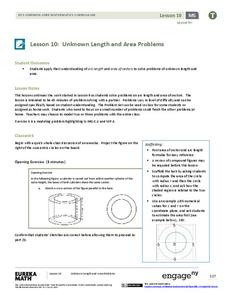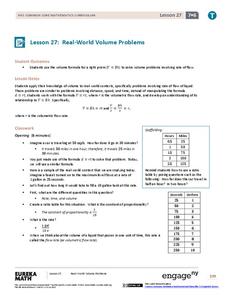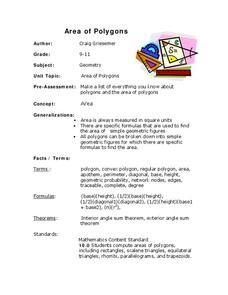Los Angeles County Office of Education
Assessment For The California Mathematics Standards Grade 6
Test your scholars' knowledge of a multitude of concepts with an assessment aligned to the California math standards. Using the exam, class members show what they know about the four operations, positive and negative numbers, statistics...
Alabama Learning Exchange
Polygons-Changing Area Versus Changing Perimeter
Investigate the area and perimeter of polygons in this geometry lesson. Young geometers use grid paper to draw a quadrilateral and calculate its area and perimeter. They also read The Greedy Triangle to identify the changing shape of...
Illustrative Mathematics
Finding Areas of Polygons, Variation 1
An exercise in finding the area of polygons by decomposing into triangles and composing into rectangles is the focus of this resource. Make several copies of the worksheet for each participant. Ask learners to use colored pencils to...
Curated OER
3D Shapes
In this 3D shapes worksheet, 10th graders solve and complete 5 various types of problems. First, they find the area of the logo item shown. Then, students find the height of a cuboid given its length and width. In addition, they circle...
Curated OER
Pyramids and Prisms: Guler's Formula
Sixth graders detect and categorize the attributes of geometric shapes to solve problems. In this geometry lesson, 6th graders construct a variety of polyhedra. Students recognize the relationships between two dimensional and three...
Curated OER
Make the Shape into a Solid
In this geometry worksheet, students rewrite word problems using symbols and formulas. They calculate the volume of the different solids. There are 8 questions.
Inside Mathematics
Hexagons
Scholars find a pattern from a geometric sequence and write the formula for extending it. The worksheet includes a table to complete plus four analysis questions. It concludes with instructional implications for the teacher.
Inside Mathematics
Conference Tables
Pupils analyze a pattern of conference tables to determine the number of tables needed and the number of people that can be seated for a given size. Individuals develop general formulas for the two growing number patterns and...
Mathematics Assessment Project
Evaluating Statements About Enlargements
Double, toil ,and double linear dimensions. Learners first complete an assessment investigating how doubling linear dimensions affects the area of pizzas and the volume of popcorn containers. They then complete an activity investigating...
Curated OER
Dihedral Figures
Middle and high schoolers perform transformations. In this web based lesson, students explore dihedral figures. They use the web tools to translate, rotate, and reflect figures. Pupils identify lines of symmetry.
EngageNY
Cones and Spheres
Explore methods for finding the volume of different three-dimensional figures. The 20th lesson plan in the 25-part series asks learners to interpret diagrams of 3-D figures and use formulas to determine volume. Scholars must use the...
Inside Mathematics
Rugs
The class braids irrational numbers, Pythagoras, and perimeter together. The mini-assessment requires scholars to use irrational numbers and the Pythagorean Theorem to find perimeters of rugs. The rugs are rectangular, triangular,...
Royal Society of Chemistry
Naming Complexes—Ligands
Naming complexes can be, well, pretty complex! Simplify a study of ligands using interactive puzzles. Junior chemists match up the name, formula, and complex name, then solve a series of logic games with the information.
EngageNY
Unknown Length and Area Problems
What is an annulus? Pupils first learn about how to create an annulus, then consider how to find the area of such shapes. They then complete a problem set on arc length and areas of sectors.
Radford University
Fun with Solids
Geometry is all around us—if we're only willing to look. The final three activities of the Fun with Solids unit continue work on surface area and volume. For lesson three, scholars investigate the formulas for spheres and solve a problem...
EngageNY
Real-World Volume Problems
How long does it take to fill a typical swimming pool? Prepare your pupils to answer similar questions using the 28th lesson in the 29-part module. The engaging lesson asks individuals to solve problems connected to the flow rate. All...
Curated OER
Learning About Volume
Learners explore the concept of volume. They develop formulas for volume of prisms. Then use their formulas to find missing dimensions of various prisms such as height, length, width, radius, and diameter.
Curated OER
Cylinder Volume Lesson Plan
Tenth graders define the formula for cylinders and use it to solve real world problems. In this geometry lesson, pupils differentiate between area, perimeters, 2D shapes, 3D shapes, and volume of prisms, cylinders and spheres. They...
Curated OER
Volume of Rectangular Prism and Cylinder
Learners calculate volume of rectangular prisms and cylinders. They draw and label figures to use the formulas to calculate the volume of rectangular prisms. In addition, they use objects to calculate volume in a hands on activity.
Curated OER
Measurement: Cylinders
Math scholars observe and demonstrate how to calculate the surface area and volume of cylinders. They analyze pictures of various cylinders on a handout, solve problems on two worksheets independently, and discuss the answers to the...
Curated OER
Finding the Area and Perimeter of Polygons
Seventh graders practice finding the area and perimeter of polygons. In this polygon area instructional activity, 7th graders brainstorm shapes and take a walk to locate shapes. Students record properties of shapes and use...
Curated OER
Area of Polygons
Students engage in a lesson plan that is about the concept of polygons and focuses upon finding the area. They use formulas provided in the lesson plan in order to solve problems given by the teacher for independent practice. Geometric...
Curated OER
Geometry: Area Project
Sixth graders identify and use area formulas for finding the area of geometric shapes.
Curated OER
Surface Area with Polydrons
Students explore measurements by analyzing geometric shapes. In this surface area lesson, students identify the terms volume, weight, perimeter and area in order to find the requested measurements of specific polygons. Students utilize...



